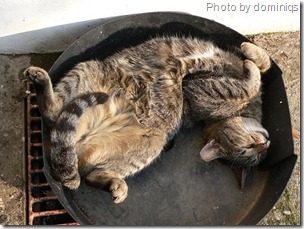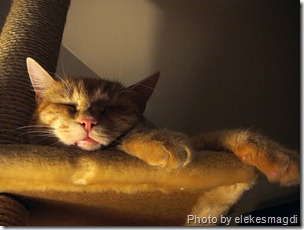Archive for the ‘Sleep’ Category
How to Become a Morning Person
For as long as I can remember, I haven’t been a morning person, preferring to stay up late over prying my heavy head off the pillow in the cold morning. I’ve been a night owl most of my life, with some of my best work and inspired thought happening after 10pm. Throughout the years, I’ve been following the growing body of research that points to night owlish (or ‘larkish’) as a genetic trait: there’s apparently a specific genetic variant that can indicate whether someone is a night owl, a lark, or somewhere in between the two. Unfortunately this indicator wasn’t included in my 23andMe genetic profile a few years ago so I’m not sure where I fall on the continuum.
But even if I knew where my genes wanted me to be, there isn’t much I (or most of us) can do about societal, professional, or family pressure to wake up early. Every single day, one of our kids wakes up at or before 6:30am. At least 3 or 4 mornings per week I need to be out the door by 7:20am for school drop-off prior to a can’t-miss 8am meeting. And when I get home at night, by the time I’ve eaten dinner, cleaned up afterwards, spent time with my family, and put the kids to bed, it’s already after 9pm. So in order to do anything beyond “the basics” in life – including strength training, meditation, writing, extra work, or anything else – I have a simple choice: I either do it late at night and suffer the next morning, or I get up 30-60 minutes earlier. I choose not to suffer.
Now, for a night owl, the thought of waking up earlier than 6:30am is anathema. But for the last several months I’ve been doing it, and not only has it gotten easier, but I’ve ‘dialed it in’ to be a habit that I feel has dramatically improved my overall well-being, productivity at work, and presence at home. These days I’m up at 5:45am to drink a cup of loose-leaf green tea and get a focused kettlebell or bodyweight workout in – or some dedicated writing – before my kids wake up and the house starts buzzing.
I’d be lying if I said the transition was all kittens and rainbows. It was actually quite hard, and is still not without its challenges occasionally. But I’m consistent about it and am determined to make it work. Oddly, on the days I “sleep in” until 7 or 7:30am I don’t feel quite as right compared to those when I’ve gotten up and have broken a sweat before the sun rises.
Here are the ways I became a morning person and how you can too.
How to Keep the Creativity Train Running on Time

Some days you feel like absolutely nothing can go wrong. You’re on fire, unstoppable. Ideas are flowing, confidence is high, and you’re walking around with your chin up and your back straight. There’s no better feeling than knowing you’re at the top of your game. The world is your oyster. Everything you touch seems to turn to gold and you wonder how you were ever stagnant before.
Until the past few years, I had really only been able to identify these times when looking back. Now I’m acutely aware of them when I’m in them and I grab onto them and try not to let go when that train is rolling.
But these feelings never last long. Maybe a day or two, maybe a little more. If you’re lucky, you’ll get a full week of this superhuman ability to create things out of nothing without obstruction. Sooner or later things will return to normal and there’s no explanation why this happens. You just can’t self-motivate like you were able to the day before. Ideas are at a distance, just out of reach. You aren’t feeling flow and a day’s worth of work is taking two full days instead of just three hours.
It’s crazy frustrating when this happens. You try and recreate the environment, the feeling you had, and you just can’t. Your mind has moved on, your thoughts are elsewhere, and your current experience has been altered in some inexplicable way. And you don’t like it at all.
What happened? Well, nothing at all. It’s perfectly normal for creativity to ebb and flow like this. It happens to every single creative person dozens – even hundreds – of times throughout a year. It’s just not possible to keep anything running at its highest capacity all the time.
But are there ways to keep it running for as long as you can? Maybe. There are things you can do that will help but only in the sense that they may be able to prolong that window. There’s no guarantee that these things will work every time, but if they buy you an extra few days or a shorter period in the downswing, it could be worth it.
Sleep Better: 6 Sleep Habits To Help You Focus
“I’ll sleep when I’m dead” – Some Anonymous Idiot
 We’ve all heard this quote, most likely from an interview in a business magazine with some mega-billionaire CEO. Of course this person is either a walking collection of crazy or some genetically gifted mutant. I’m actually not kidding about that mutant option, as those who thrive on little sleep may have a rare genetic mutation according to a recent sleep study at the University of San Francisco. Of course, that mutation was found in just 2 out of 1000 study participants – so rare is right.
We’ve all heard this quote, most likely from an interview in a business magazine with some mega-billionaire CEO. Of course this person is either a walking collection of crazy or some genetically gifted mutant. I’m actually not kidding about that mutant option, as those who thrive on little sleep may have a rare genetic mutation according to a recent sleep study at the University of San Francisco. Of course, that mutation was found in just 2 out of 1000 study participants – so rare is right.
The rest of us need sleep and need it badly. And we probably need more of it than we think, or at least more than we’re inclined to let ourselves get by on.
In a 2002 study conducted by the National Sleep Foundation (PDF), it was found that the majority of American adults (68%) don’t get the recommended 8 hours of sleep needed for good health and optimum performance, and more than one-third (39%) sleep less than 7 hours nightly. Strangely (yet ironically) enough, a staggering 85% of those surveyed said they would sleep more if they knew it would improve their health.
Guess what? It does improve your health. And your sex life, body shape, and ability to stay awake during Avatar in IMAX 3D. It’s also the best way to improve your mood and the way you respond when you’re frustrated or stressed out. In other words, good sleep can keep you from being a jerk AND help you look and feel better.
Lack of sleep can also have a profound effect on memory and other cognitive skills. In an interesting study, researchers measured cognitive function in sleep-deprived, right-handed men and found that sleep deprivation has a negative effect on cognitive functions associated with "right-brained" functions such as "motor, rhythm, receptive & expressive speech, memory and complex verbal arithmetic function." (PDF link)
5 Steps To Use Lucid Dreaming To Improve Any Skill
 For many years – as long as I can remember actually – I’ve looked at sleep as a critical tool in my personal development toolbox. Sleep is so obviously important for overall health and ability to focus and it has always trumped most things for me… I identified at an early age that without sleep, my brain simply doesn’t function well.
For many years – as long as I can remember actually – I’ve looked at sleep as a critical tool in my personal development toolbox. Sleep is so obviously important for overall health and ability to focus and it has always trumped most things for me… I identified at an early age that without sleep, my brain simply doesn’t function well.
There has been a lot of interesting research on sleep over the last couple decades. The majority of it has focused on the importance of sleep, yet through it all 1 in 3 people are chronically sleep deprived, relying on large amounts of caffeine to get them through the day… All the while, dozing off at their desks wondering why they don’t have any energy to exercise (further exacerbating the problem!)
So what do we know about sleep and how it relates to focus?
Mayank Mehta at Brown University found that during sleep, the hippocampus and neocortex actually reconfigure themselves in order to make sense of everything from the day. Your thoughts are being structured and moved from short-term storage in the hippocampus (like RAM on a computer) to long-term storage in the neocortex (like a hard drive) while you’re drooling on your pillow. Research at Harvard Medical School also describes a process called memory consolidation whereby sleep assists us in the absorption of new information. Robert Stickgold, Harvard Medical School assistant professor of psychiatry at the Massachusetts Mental Health Center says, "It seems that memories normally wash out of the brain unless some process nails them down. My suspicion is that sleep is one of those things that does the nailing down."
Sleep is widely recognized as a time when memories and new information from the day are cemented for future reference. It’s a critical component of learning a new skill or task, and it appears that without a good night’s sleep, information can’t be retained and likely has to be relearned.




